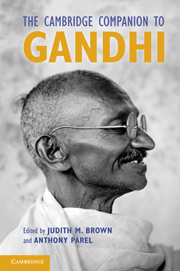Introduction
Published online by Cambridge University Press: 28 May 2011
Summary
Mohandas Karamchand Gandhi was born in Western India in 1869, a child of the Victorian age at the heyday of British imperial rule in India. He was assassinated by one of his own countrymen nearly eighty years later, in January 1948, just months after the subcontinent had gained political independence. During his long life, he had become known as Mahatma or ‘great soul’, and had risen from obscurity as a failed lawyer to become one of the most outstanding Indians active in the public life of his country and of the British Empire in the first half of the twentieth century. He is often spoken of as the ‘father’ of the new nation-state of India, but more seriously is recognized as a major practitioner of and thinker about nonviolence as a form of managing conflict and resisting injustice. Public interest in his career and thought has continued to develop into the next century, particularly as numerous groups have drawn on his example and attempted throughout the world to use nonviolence to resist multiple forms of political violence and control. There are therefore numerous reasons why it is timely to gather a collection of serious but accessible essays on his life and thought in a Cambridge Companion, designed to reach a wide readership, both inside and outside the world of education, who may know little about India but wish to know more about such a significant and intriguing figure.
- Type
- Chapter
- Information
- The Cambridge Companion to Gandhi , pp. 1 - 8Publisher: Cambridge University PressPrint publication year: 2011
- 2
- Cited by



